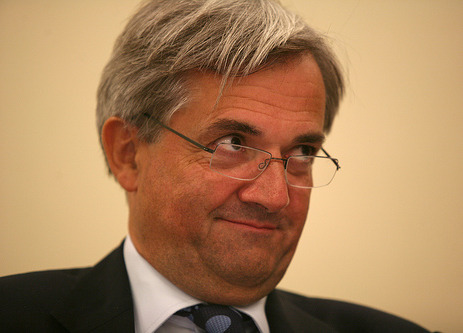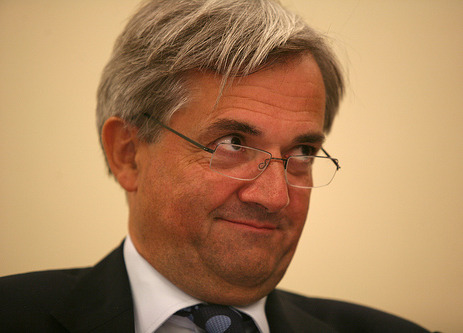 Energy and Climate Change Secretary Chris Huhne.Photo courtesy Liberal Democrats via FlickrIn the wake of the new budget released in the U.K. on Tuesday, Energy and Climate Change Secretary Chris Huhne has been putting some flesh on the bones of the promised Green Deal for households.
Energy and Climate Change Secretary Chris Huhne.Photo courtesy Liberal Democrats via FlickrIn the wake of the new budget released in the U.K. on Tuesday, Energy and Climate Change Secretary Chris Huhne has been putting some flesh on the bones of the promised Green Deal for households.
Huhne is a Liberal Democrat, so his remarks at the Economist Energy Summit began with the now ritual reassurances about the ability of coalitions to tackle the big challenges. The last one, he pointed out, won the war. (It wasn’t you Americans after all!) This one will have to tackle the greatest challenge facing the nation (that’s the deficit) and the greatest challenge facing humanity (that’s the climate), both at the same time. The challenge is so humungous it almost calls for the underwear to be worn outside the trousers, as in cartoonist Steve Bell’s famous caricature of luckless Prime Minister John Major.
To the rescue in tackling this stereo apocalypse comes the “Big Society,” and as of this week, the Green Deal. Huhne pointed first to how other nations are getting on with it — “Even in the United States” — putting Europe’s lead in low-carbon tech at risk. That’s the rest of Europe, presumably, since the U.K. has been doing little more than blowing its vuvuzela in the spectator area when it comes to renewables. He then softened his audience up a bit further by pointing out how “events in the Gulf of Mexico” have given us all pause for thought on the question of energy security and energy prices. Given all this and the need to cut emissions drastically and renew our energy infrastructure, he promised a reshaping of the climate-change levy to create a carbon price floor.
But his main thrust was about the fourth low-carbon energy source. The first three are renewables, nuclear, and fossil fuels with CCS. The fourth is energy efficiency. Huhne pointed out the tragic state of the U.K. housing stock when it comes to energy, saying we “may as well be burning £50 notes outside our front doors.” Crucially, Huhne is reframing this challenge as a means of driving economic recovery, pointing to 14 million homes in the U.K. that might benefit from the Green Deal, which could “unlock tens of billions of spending in the coming years.” But it’s not the public coffers where this money is locked up, but in energy companies and high-street retailers who are willing to pay for their customers’ energy-efficiency investments, as long as householders then pay the money back from the energy savings they make.
There’s proven demand for such “pay as you save” schemes and some have been trialled. But there are some tricky things to sort before this can be applied across the housing stock. What’s to stop householders turning their heating up a bit and wiping out any savings? What about the very long payback periods for the more expensive measures like triple glazing? Who will underwrite the risk of these investments never paying back? In the budget, Chancellor George Osborne put the figure of £6,500 ($9,700) per household as the cost of retrofit, but in truth this would take most households to a 30 percent reduction. Since the need is to go to 90 percent ultimately, it would be much better done straightaway rather than in two or three phases, but of course this will cost more — perhaps £40,000 ($59,696) per household — a rather more daunting investment scenario for both householder and service provider.
So, some way to go, but this is promising stuff. It was also interesting to hear Huhne reiterate the coalition commitment to new nuclear (to which he is personally deeply opposed), but also remind his audience that there would be no public subsidy, “a pledge robustly guaranteed by the state of the public finances.” Whether this, in truth, puts nuclear back on the path into the wilderness, we can only hope.




